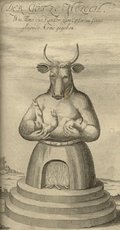TestMain
From Plastic Tub
|
In speaking of Molech one must be aware of the distinction between the general phenomena of Molechianism and the particular name itself as it refers to the Semitic manifestation. In Biblical Canaan, Molech -- or Moab, Ba’al – was worshipped as the Lord of Fire and God of War. The name itself is generally understood to mean “King” or, more generally, “owner.” Though most closely associated with Hebriac tradition, Molech .. |
In speaking of Molech one must be aware of the distinction between the general phenomena of Molechianism and the particular name itself as it refers to the Semitic manifestation. In Biblical Canaan, Molech -- or Moab, Ba’al – was worshipped as the Lord of Fire and God of War. The name itself is generally understood to mean “King” or, more generally, “owner.” Though most closely associated with Hebriac tradition, Molech .. |
In speaking of Molech one must be aware of the distinction between the general phenomena of Molechianism and the particular name itself as it refers to the Semitic manifestation. In Biblical Canaan, Molech -- or Moab, Ba’al – was worshipped as the Lord of Fire and God of War. The name itself is generally understood to mean “King” or, more generally, “owner.” Though most closely associated with Hebriac tradition, Molech .. | Easily the most understood of groups secreting themselves away from direct observation, the League fashions itself after Minoan Craft Ritual, Fornication Timetables and late-style arithmetical pant-fashions -- at least in so much as the latter represents a conquering fashion, a being made of spaces between fingers five -- and in that failure is a layer of experience, as the Hand too removes sensation |
In speaking of Molech one must be aware of the distinction between the general phenomena of Molechianism and the particular name itself as it refers to the Semitic manifestation. In Biblical Canaan, Molech -- or Moab, Ba’al – was worshipped as the Lord of Fire and God of War. The name itself is generally understood to mean “King” or, more generally, “owner.” Though most closely associated with Hebriac tradition, Molech ... |
In speaking of Molech one must be aware of the distinction between the general phenomena of Molechianism and the particular name itself as it refers to the Semitic manifestation. In Biblical Canaan, Molech -- or Moab, Ba’al – was worshipped as the Lord of Fire and God of War. The name itself is generally understood to mean “King” or, more generally, “owner.” Though most closely associated with Hebriac tradition, Molech .. </table> |


